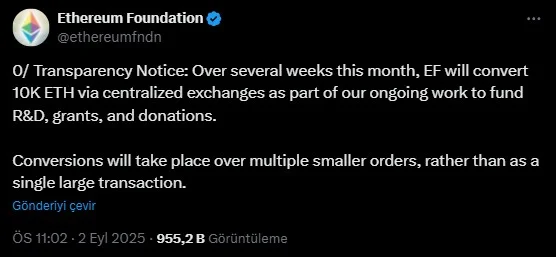The Ethereum Foundation's decision to sell 10,000 ETH (approximately $42.7 million) via centralized exchanges has generated widespread criticism in the cryptocurrency community. The foundation explained that this sale was intended to support long-term goals and maintain transparency.
The sale, announced in a transparency statement published on September 2nd, will be phased in over several weeks. It states that the proceeds will be used for research and development activities, ecosystem grants, and donations. It emphasized that transactions will be made in smaller increments, rather than a massive one-time block sale, to mitigate any potential negative impact on the market. The foundation's announcement was also shared on the official X (formerly Twitter) account and received hundreds of thousands of views within hours.

The foundation's move was met with criticism from some members of the Ethereum community. Critics argue that selling ETH directly on centralized exchanges could damage market sentiment and create unnecessary pressure. Instead, they argue that the Foundation should leverage existing decentralized finance (DeFi) protocols to raise funds without relying on centralized platforms.
AaveChan founder Marc Zeller, a prominent community figure, summarized this view by saying, "Just use Aave." Zeller's comment reflects a widespread belief that the Foundation should also use the DeFi infrastructure it helps support. These criticisms are based on the argument that large sell-offs can be perceived as a bearish signal for the market, contradicting Ethereum's decentralized spirit. The Foundation's previous borrowing of $2 million worth of GHO stablecoin through the Aave protocol using Wrapped ETH as collateral demonstrates the feasibility of such decentralized methods.
The Ethereum Foundation has previously sold ETH
The Ethereum Foundation has historically sold ETH during strong market periods to diversify its reserves and fund long-term projects. This latest plan is seen as a reflection of its strategy to support ecosystem growth.
Binji, a Foundation employee, defended the sale by viewing it in the context of the broader market. He noted that the total of 10,000 ETH is a relatively small amount compared to the 403,800 ETH purchased by institutional companies in the same week. Binji emphasized that the Foundation's sales ultimately strengthen the Ethereum network by attracting more developers and users to the network, thus increasing the overall value of the ecosystem. This statement suggests that the sales should be viewed as an investment in the ecosystem rather than short-term speculation.
For now, the Foundation insists that its gradual sales approach will minimize the negative impact on the market. However, with Ethereum trading at critical levels, it remains to be seen how the sales will play out and whether they will trigger volatility in the coming weeks. This tension between the community's sensitivity to transparency and decentralization and the Foundation's financial strategies will continue to be closely monitored in the crypto world.
At the time of writing, Ethereum's ETH is trading at $4,370, a 0.6 percent decrease.




